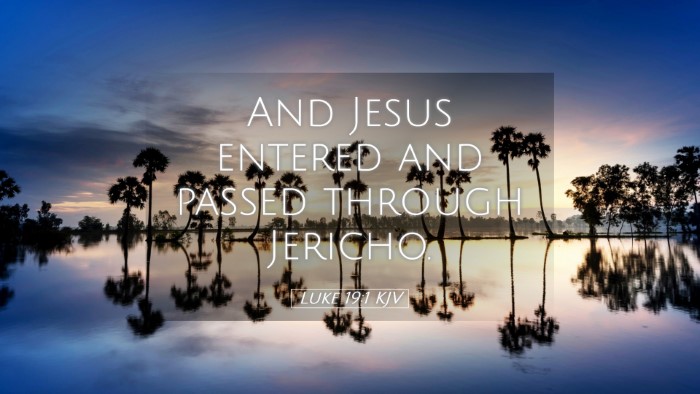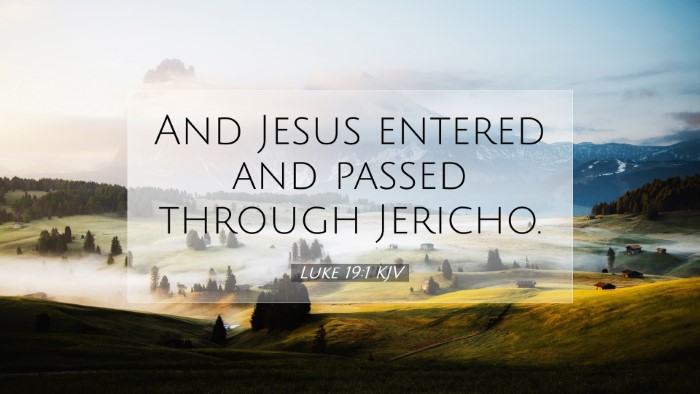Commentary on Luke 19:1
Contextual Background: Luke 19:1 states, “And he entered and passed through Jericho.” This moment captures a significant interaction during Jesus' final journey to Jerusalem. Jericho was a populous city, known both for its wealth and its strategic location.
Overview of Luke 19:1: This verse marks the beginning of the rich narrative involving Zacchaeus, emphasizing not only Christ's ministry to the marginalized but also his penetrating ability to see beyond societal status. Jericho, known for its palm trees and bountiful harvests, serves as both a physical and metaphorical backdrop to the transformative acts of Jesus.
Insights from Commentaries
Matthew Henry's Commentary
Matthew Henry emphasizes that Jesus’ entering Jericho signifies a ministry that breaks through societal and religious barriers. Henry notes, “Our Lord Jesus bestowed special tokens of his grace upon those who seemed least deserving.” This aligns seamlessly with the ensuing encounter with Zacchaeus, demonstrating how Jesus actively seeks out those marginalized by society.
Albert Barnes' Notes
Albert Barnes highlights the significance of Jericho as a city of both ruins and prosperity. He observes, “In Jericho, the rich and powerful lived, as well as the poor and outcast.” This reflection serves to underline the diverse social dynamics Jesus engages with. Barnes points out that entering a city was not merely a physical action, but a statement of intent—Jesus came for all, irrespective of their social standings.
Adam Clarke's Commentary
Adam Clarke provides detailed insights on the geographical and historical implications of Jericho. He asserts, “Jericho was known for its wealthy tax collectors and societal outcasts.” Clerks’ reflections on the city's socio-economic environment prepare the reader for Zacchaeus, a Jewish tax collector, reinforcing the theme of divine grace reaching into the depths of sin and societal rejection.
Thematic Elements
- The Pursuit of Christ: Each commentary suggests a divine initiative in seeking out the lost, illustrated profoundly through Jesus’ actions. It reminds readers that God actively pursues sinners.
- Social Implications: The combination of Matthew Henry’s view on grace and Albert Barnes’ social observations bring forth an understanding of Jesus’ approach to the marginalized, challenging societal norms.
- Transformation: Zacchaeus’ future encounter with Christ symbolizes the transformative power of divine grace—where societal identity gives way to divine acceptance and working out of faith.
Application for Today
This narrative invites pastors, theologians, and all believers to reflect on their own positions within society. Are we embodying the welcoming nature of Christ? How do we engage with those who are seen as outcasts or less deserving of mercy?
As Jesus moves through Jericho, He illustrates the principle of inclusion and love that must guide modern ministry efforts. Leaders are called not just to preach to the ‘righteous’ but to actively seek out those who are lost, offering hope and transformation through Christ.
Conclusion
Luke 19:1, while brief, sets the stage for a profound encounter that dramatically demonstrates the heart of Jesus’ mission. The combined insights of Henry, Barnes, and Clarke reflect a deep understanding of Christ’s inclusivity and the hope He provides. As we delve into the entirety of the passage regarding Zacchaeus, let us remember Luke 19:1 as a declaration of Jesus’ presence among us and His willingness to transform lives.


